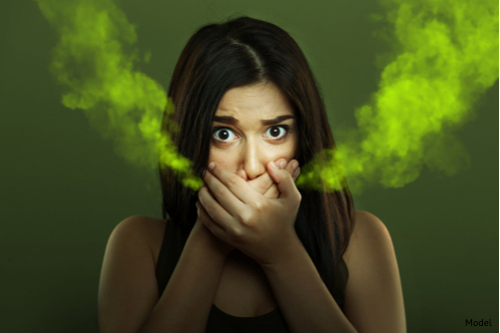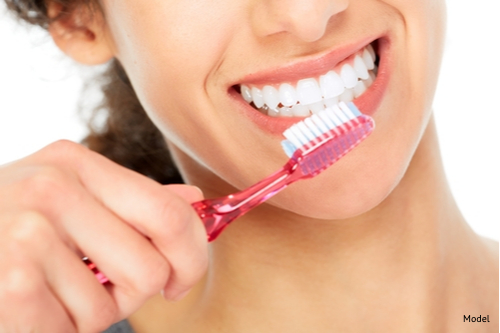How Can You Fight Bad Breath?
3 Min Read
Every person will have bad breath at some point or another, but it’s usually nothing that brushing your teeth or swishing with mouthwash can’t fix.
Repeated bad breath, however, may be a sign of something worse.

Chronic bad breath is difficult to self-diagnose because it is almost impossible to smell your own breath.
In many settings, the people around you may not be willing to mention it out of politeness or embarrassment.
What Is Chronic Bad Breath?
Chronic bad breath is medically known as halitosis, and it is a condition that is thought to affect over 65 percent of adults.
Most people assume that bad breath is due to one of two reasons: diet or inadequate daily oral hygiene.
There is some truth to this, but these are not the only or even the primary cause of halitosis.
What Causes Halitosis?
Halitosis is caused by sulfur compounds, the same sulfur that is responsible for the unpleasant odor of rotten eggs.
This sulfur, found in the mouth when bacteria develops, is not readily eradicated.
Additional Halitosis Factors
Bacteria is the primary cause of halitosis; however, the rapid growth of this bacteria is affected by many factors, including:
- Inadequate oral hygiene: The halitosis-causing bacteria is usually no match for proper brushing, flossing, and tongue scraping exercises. When your daily oral hygiene practices suffer, bacteria can survive and worsen to form a sort of plaque on the back of your tongue.
- Dry mouth: Much like brushing, drinking adequate amounts of water, or even rinsing your mouth out with water will break apart the bacteria and keep your breath smelling fresh.
- Poor dental work: Faulty fillings allows bacteria to develop and grow in the mouth. Halitosis caused by failing dental work is lessened when the work is redone correctly and safely.
- Gum disease: Periodontal disease opens your mouth and your body up for a host of problems, including bad breath.
- Diet: There are some situations where halitosis comes from diet. Individuals who consume a lot of sugary foods (combined with poor oral hygiene) can see their one-time bad breath turn into chronic bad breath.
How to Cure Bad Breath
Many men and women turn to mouthwashes, mints, and sticks of gum to mask their bad breath.
While these can be effective in the short-term, they only do just that: mask the bad breath rather than eliminate it.
Mouthwashes and mints cannot correct the underlying cause of halitosis.
Patients should first switch to chlorine dioxide toothpaste and mouthwash. Chlorine dioxide has been shown to destroy the sulfur compounds that reside in your mouth.
This, combined with a healthy diet, not smoking, and staying hydrated, will help keep bad breath at bay.
Why Should You Care About Bad Breath?
Whether or not the people around you mention your halitosis, there is a good chance that they notice it. Don’t let bad breath be something that negatively affects your professional or personal relationships.
Bad breath—even chronic bad breath—is manageable and reversible.
Tips to Prevent and Manage Halitosis
In addition to using chlorine dioxide toothpaste and mouthwash to kill the sulfur-causing bacteria, men and women should incorporate these bad breath home remedies into their daily routines.
- Brush your teeth at least twice a day
- Floss your teeth at least once a day
- Drink plenty of water
- Scrape your tongue regularly with a tongue scraper, or at least your toothbrush
- Replace your toothbrush every two or three months
- Schedule regular check-ups with your dentist to ensure that your halitosis, and overall dental health, is managed and maintained
Do You Have Additional Questions?
If you want to learn more about halitosis, or you have another dental concern, contact Dr. Fiss by calling (312) 642-6631 or by filling out his online contact form.
